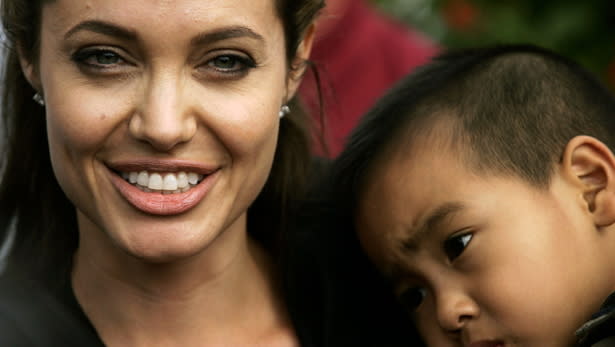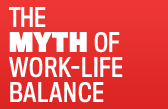'Supermoms' Should Tell the Truth About Their Perfect Lives
They make it look easy. But the women who seem to "have it all" are navigating mazes of complex logistics every day.

Angelina Jolie poses with her son Maddox in a 2005 photo. (Reuters)
Kudos to Anne-Marie Slaughter for shedding light on the sacrifices and choices high-powered women in Washington make about work and family. The more transparency into how Americans manage caring for children while earning a living, and vice versa, the better.
And yes, as Professor Slaughter writes: "If women are ever to achieve real equality as leaders, then we have to stop accepting male behaviors and male choices as the default and ideal. We must insist on changing social policies and bending career tracks to accommodate our choices, too." To that statement I would add only that often it's the requirements of our realities (be they biological, familial, medical, financial, logistical, etc.) rather than our deliberate choices that necessitate a non-linear path.
In my "past life" -- before an eight-year career as a stay-at-home mom -- I was a senior editor at a popular celebrity magazine. I cringed whenever a writer or source gushed about an actress or other famous woman being a "devoted" mom. While the typical new mom can barely take a shower, famous moms are somehow able to look fabulous, maintain a fabulous career and appear in fabulous places, all while being fabulous, attentive, "devoted" moms.
A debate on career and family See full coverage
I don't question the love any globetrotting star has for her children. But because there's little explanation about exactly how super successful, celebrated women with children do it all, regular "real-life" moms -- many of whom step out of the workforce or let job opportunities and larger ambitions lie -- often look and feel like a bunch of slackers.
When a layoff and stagnant post-9/11 job market in New York led my husband to accept an offer in Maryland, I became a weekday single mother, left alone to juggle a long workday, a long and unreliable commute, a live-out nanny and a toddler I often saw awake for less than an hour a day. I quickly realized that I needed to live a different way and work a different way. Soon after quitting my Manhattan-based magazine job a second pregnancy (surprise, twins!) put me on bedrest. Three small children, including one with learning differences and therapy needs, kept me out of the workforce.
My 2008 book The Stay-at-Home Survival Guide includes an essay titled "Who Takes Care of Katie Couric's Kids?" It was a hypothetical question based on the TV journalist's "superwoman" reality. Couric's daughters are now young adults, but when they were small she was a widowed mother of two who worked more than full-time co-hosting the Today show and traveling the world. How did she do it? How does any woman with children and a super-charged career do it? Do they have stay-at-home husbands or around-the-clock nannies? Do they go days without seeing their kids?
Famous and high-powered men who have children are rarely feted for their ability to be both dads and career-driven movers and shakers. Men are expected to be out in the world while someone else cares for their kids. However, well-known women who have children are frequently promoted on magazine covers as both career successes and ("devoted") moms. The message is simultaneously encouraging ("She can do it, so can you!") and demeaning ("She can do it, why can't you?").
The solution isn't to ignore the parenting part of a woman's life and treat her more like a man. It's exactly the opposite: discuss the parental logistics required of both women and men. If only women are seen as having hands-on parenting responsibilities, the workplace norm will continue to be male-oriented, with work-family policies considered a female-needed accommodation.
The veil about how public figures "have it all" is occasionally lifted. Arianna Huffington, Michelle Obama, and MSNBC host/professor Melissa Harris-Perry have been open about depending on their mothers as live-in child care providers. Before Baltimore Mayor Martin O'Malley become the governor of Maryland, I interviewed his wife, Katie, a district court judge, and asked how the couple was able to manage two frontline careers and four kids. Their secret weapon: her nearby parents.
On occasion, high-profile women and men reveal that they, too, find it difficult to juggle work and family. In 1991, journalist Meredith Vieira famously left 60 Minutes because the job was incompatible with parenting. Writing in Newsweek earlier this month, actress Maggie Gyllenhaal, who recently gave birth to her second child, shared that her husband, actor Peter Sarsgaard, plaintively asked, "How are either of us going to work now?" Her response: "I have no idea."
In most families, it's financially essential to maintain or, in my case, reintroduce two incomes. By not being collectively honest about how Americans care for their kids and provide an income, most of us are left to perform the juggling act on our own and pretend we have it all under control.
As a nation, we close our eyes to the reality that child care is a largely under-the-table business provided by women who may not be legally allowed to work in the U.S. We ignore that these care providers have very important and difficult jobs, and that after a day's labor they've earned little and most have toiled without employee benefits such as health insurance, a 401(k) plan, or income that counts toward Social Security retirement credits. The dirty laundry of our child care arrangements are occasionally aired, such as when Judge Zoë Baird's nomination to be Bill Clinton's Attorney General crashed and burned with the revelation she hadn't paid employment taxes for her nanny and driver, both of whom were illegal immigrants. That happened in 1993. Little has changed. Many employed parents today are similarly playing with fire.
My children are now in full-day school and I'm back in the workforce. During my years at home I truly believed I would never find a "back-on" ramp. (Note of advice: Even when wealth or frugality can allow for a mom or dad to be home with the kids, it's often emotionally and intellectually essential for the primary caregiver to still engage with the outside world sans children. Doing so through freelance and volunteer projects kept my professional skills and contacts current.) I feel fortunate to have a renewed career in a family-friendly workplace that makes use of my experience and education. The job's flexibility enables me to be in the workforce, and it keeps me a hard-working and loyal employee.
I agree with Anne-Marie Slaughter that "women should think about the climb to leadership not in terms of a straight upward slope, but as irregular stair steps, with periodic plateaus." Unlike my husband, I couldn't stay full-career throttle in my 30s. My 40s have been a mixed bag of caregiving and paid work. Like many women with children, I'll be less encumbered and raring to do new things in my 50s and 60s. A woman's work and family timeline often can't be the same as a man's, and it shouldn't have to be.
Much needs to change. (One example: It's time for the K through 12 school calendar to mesh more appropriately with the contemporary work schedule and fact that we no longer need child labor to help harvest our summer crops.) For the sake of my son and twin daughters, I hope that by the time they become parents our nation's work-family policies and norms will have progressed far forward and not, as seems a real possibility, fallen further behind.
More From The Atlantic

